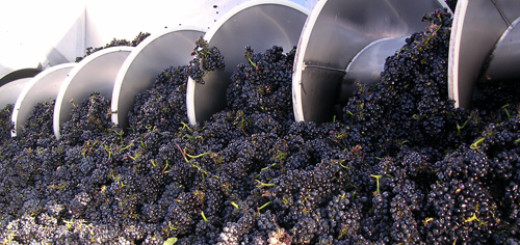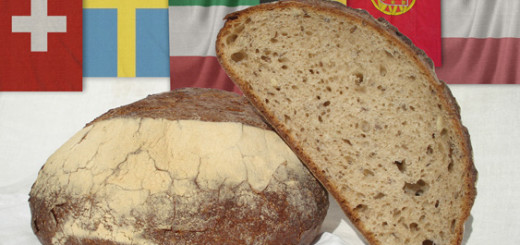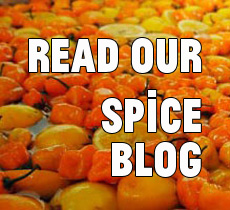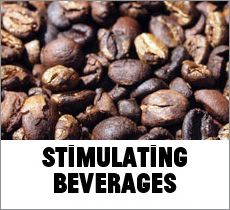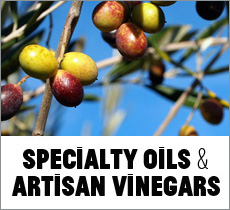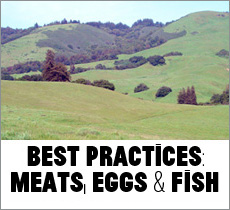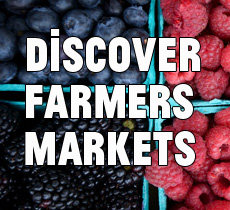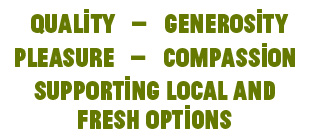Useful Tools & Powerful Messages at EcoFarm 2016
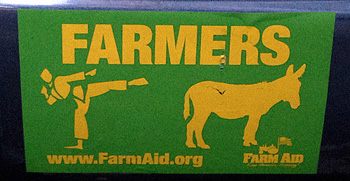
vintage FarmAid schwag spotted at #EcoFarm2016
We’re just back from #EcoFarm2016 and feel full of information and purpose to promote a more fair and delicious food system. The meals were indeed amazing both for the flavors in each 100% organic dish and for the randomized way everyone was directed to their table, making mealtime conversation intellectually exciting. “Who will I sit next to this time?” I wondered after having some great mealtime chats with, among others, the folks from Santa Cruz’s Homeless Garden Project, a permaculture expert, software engineers for Tend digital smart farm tools, and a pro-environment farmer running for San Luis Obispo County’s Board of Supervisors District 5. The food was great and the conversation was even better!
We will always make a plan to attend these group meals: thanks to EcoFarm for the tickets to these well-executed institutional meals delivered by Asilomar’s professional staff. Well done!
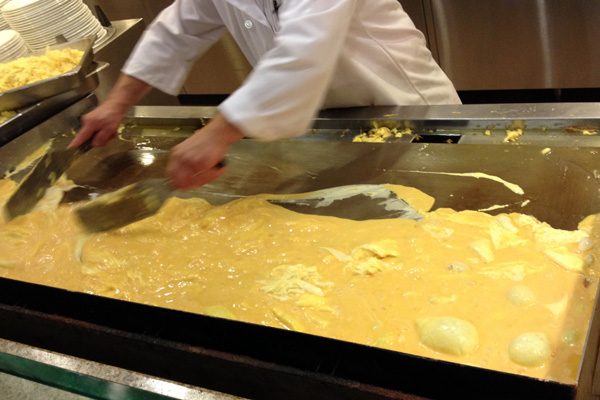
ninja scrambled eggs: this man is a professional
Tools and Ideas for Small-scale Farmers to Make Effective Choices that Set Up Farms and Gardens for Success
Slow Poultry: Overview of Sustainable Poultry Production
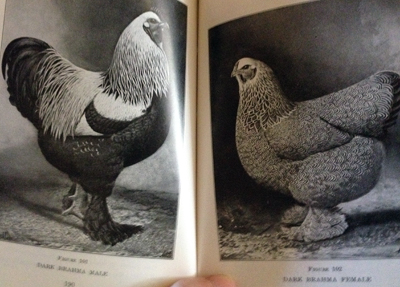
a pair of Dark Brahmas from the Standard of Perfection
Jim Adkins of the Sustainable Poultry Network recommends raising “slow poultry” that’s bred for survival in discrete climates with the desired quality outcome in birds and eggs. A former large-scale poultry farmer and evangelist to slow down production practices, Adkins confirms that everything we see in the poultry section of those activist foodie documentaries such as American Meat “is pretty darn accurate.” He switched to a sustainable poultry model and provides guidance to other farmers and poultry keepers in making a good plan for raising the right bird. Adkins encourages prospective poultry keepers to thoroughly research the source of their chicks to ensure a sustainable supply from those pursuing best practices to enhance the breed, not the same old genetically sloppy corporate chicken. Learn about heirloom birds from older copies of the Standard of Perfection, a breed standard reference guide first published by the American Poultry Association in 1874. We look forward to adding the right chickens to the Spice house scene in 2016.
Building Regional Food Systems Through Innovation, Creative Thinking, and Partnerships
One of the most hopeful conference sessions at EcoFarm, “Building Regional Food Systems” was brimming with positive energy, impressive financials, and a standing room only crowd that spilled out the door. One of the panelists, Québécois farmer Jean-Martin Fortier and his family own and operate an organic farm on 1.5-acres, Les Jardins de la Grelinette, named after the back-saving broadfork tool for retaining soil layer integrity while profoundly aerating well composted raised beds. This farm produces $150,000 in yearly sales from the labor of just 4 people; now he and other organic famers might have found one of their largest and most consistent customers. As a healthy, sustainable ingredients and recipe delivery company, Blue Apron can become the most steady customer of these organic farms, adding a layer of certainty to the often-risky agricultural life. Ecologically-oriented famers including JM Fortier and Tim Mueller of CCOF-certified Riverdog Farms joined with Blue Apron co-founder Matthew Wadiak to discuss and review this new way forward that helps prepare a destination for carefully-grown quality ingredients that can support young farmers who want to enter this market to produce and sell pesticide-free food to a burgeoning customer base. A great message about growth in this sector of the food system: we need more organic farmers producing food in a way that earns them regular income and time to have a life.
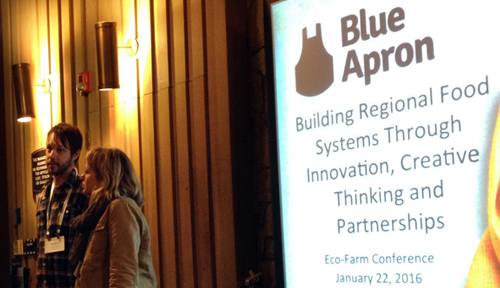
JM Fortier of Les Jardins de la Grelinette and Beth Forster of Blue Apron chat before the session
On-Farm Research: Why Is It Important?
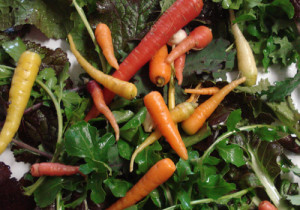 Jared Zystro of the Organic Seed Alliance encourages organic-oriented farmers to conduct on-farm research in collaboration with scientists and extension agents. Participatory research of organic operations by farmers planting some or all organic seed can help solve new and chronic on-farm challenges. We sat next to Jared at one of the breakfasts featuring a perfectly spicy sausage link and eggs—so good!—and had a chance to pick his brain about the California seed law. He remarked that this law’s darker purpose might be the prohibition on any further local efforts to ban the cultivation of GMO$ on a county by county basis, essentially limiting citizen opportunities to establish the rules on local cultivation of genetically engineered plants sloshing around in glyphosate. This seemed to him a far more serious component of the law than a prohibition on commercial growers from sharing seeds, the part of the law that draws the most attention and ire. Furthermore, this is the component of the GMO$-friendly language that was written by the anti-social folks at ALEC, the right-leaning zombie lobbying organization, and inserted into this established California seed law to update it to protect chemical-intensive conventional industrial agriculture: gross.
Jared Zystro of the Organic Seed Alliance encourages organic-oriented farmers to conduct on-farm research in collaboration with scientists and extension agents. Participatory research of organic operations by farmers planting some or all organic seed can help solve new and chronic on-farm challenges. We sat next to Jared at one of the breakfasts featuring a perfectly spicy sausage link and eggs—so good!—and had a chance to pick his brain about the California seed law. He remarked that this law’s darker purpose might be the prohibition on any further local efforts to ban the cultivation of GMO$ on a county by county basis, essentially limiting citizen opportunities to establish the rules on local cultivation of genetically engineered plants sloshing around in glyphosate. This seemed to him a far more serious component of the law than a prohibition on commercial growers from sharing seeds, the part of the law that draws the most attention and ire. Furthermore, this is the component of the GMO$-friendly language that was written by the anti-social folks at ALEC, the right-leaning zombie lobbying organization, and inserted into this established California seed law to update it to protect chemical-intensive conventional industrial agriculture: gross.
Irrefutable Information for Consumers and Communities about the Imperative to Choose Organic & Biodynamic
Got Marijuana? Make it Organic

Berkeley, of course
If you smoke cannabis or consume it in another form, we guarantee that you will become an organic convert and will only source this product from verified organic growers and trusted producers after listening to environmental scientist Dr. Andy Gordus on the terrible human and environmental toll wrecked by the toxic and destructive agricultural practices involved with producing black market weed. You won’t think organic cannabis costs too much after listening to Dr. Gordus of the California Department of Fish & Wildlife make a full accounting of the costs of cheap cartel weed: a sobering session on the true costs of agricultural malpractice in our national forests and on public lands. Biodynamic cannabis produced only with compost and composted manure inputs and tended according to the cycles of the moon will become the gold standard in this industry: you can quote me on that. Exciting news: Demeter USA continues to move forward with their biodynamic certification program for medical cannabis.
Genetic Engineering: Failed Promises, Flawed Science
My new hero Dr. Don Huber, plant pathologist and Professor Emeritus from ag-centric Purdue University, outlined with blazing brutal logic the true nature of this catastrophic chemical warfare on the human species and the world around us. The venial truth baffles the mind in the horror story of Money Over All with the approval and widespread dispersal of GMO$ and their associated chemicals especially glyphosate, approved and promoted by the US government and further promoted via the scientific community into the trusting hearts of the public.
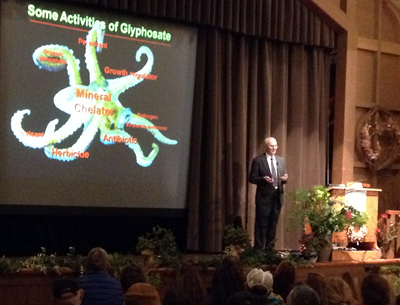
Dr. Don Huber delivers a chilling report on what we now know about glyphosate and its destructive qualities
Horror stat: In 2007, the rate of children diagnosed on the autism spectrum was 1 in 150. Without a reduction in the use of glyphosate and other endocrine-disrupting and cancer-causing chemicals, this rate increases to 1 in 2 by 2025: every other kid will be autistic. In 1970, the rate of kids diagnosed with autism was 1 in 10,000. Get informed—public interest lawyer Steve Druker’s Altered Genes, Twisted Truth further explains the deeply troubling stats Dr. Huber recounted in his presentation—and continue to transition your family and individual diet to primarily organic foods. Need more convincing that glyphosate is a much worse problem than the minimizing corporate government wants us to understand? Take it away, Jeffrey Smith of Genetic Roulette and Secret Ingredients. Convince your network to support ecological farming for cleaner food and to help us avoid an autistic future. We need to work toward a glyphosate-free future.
Cultivating Empathy: Connecting Farmed Food to a Healthy Society Through Open-hearted Attitudes and Behaviors
Building a Socially Just Local Food System
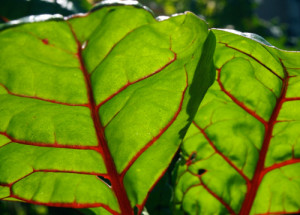 At one of the few overtly social justice-oriented sessions on the 2016 EcoFarm schedule—a presentation with Hank Herrera of New Hope Farms cooperative and Doria Robinson of Urban Tilth both in Contra Costa County—these social good farming operations captured my imagination with how much flowering goes on when organizations like these receive enough financial compost. How aggravating to hear the story of The White Pony project that beat out the very worthy growing-from-within social good gardening program delivered by Urban Tilth in Richmond as they competed for a $25,000 grant. Instead of adding desperately-needed financial compost to this scrappy social good garden plot in the city, the grant funding organization instead threw thousands of philanthropic dollars at an already heavily composted garden project that grows more of the same old, same old. The winning project collects ripe fruit from the trees and orchards of upper-income Californians and delivers it to the food bank on what I can only hope is an actual white pony. What a missed opportunity to effect real change at rock-bottom prices for philanthropists. Generous citizens looking to give should recognize how much bang they can get for their social good dollars in the inner city where $25,000 can help communities not only grow vegetables but to grow leaders who will help the people reclaim and heal these communities with healthy food and boots in the dirt. To make the greatest social impact, philanthropists, apply financial compost where it can do the most good!
At one of the few overtly social justice-oriented sessions on the 2016 EcoFarm schedule—a presentation with Hank Herrera of New Hope Farms cooperative and Doria Robinson of Urban Tilth both in Contra Costa County—these social good farming operations captured my imagination with how much flowering goes on when organizations like these receive enough financial compost. How aggravating to hear the story of The White Pony project that beat out the very worthy growing-from-within social good gardening program delivered by Urban Tilth in Richmond as they competed for a $25,000 grant. Instead of adding desperately-needed financial compost to this scrappy social good garden plot in the city, the grant funding organization instead threw thousands of philanthropic dollars at an already heavily composted garden project that grows more of the same old, same old. The winning project collects ripe fruit from the trees and orchards of upper-income Californians and delivers it to the food bank on what I can only hope is an actual white pony. What a missed opportunity to effect real change at rock-bottom prices for philanthropists. Generous citizens looking to give should recognize how much bang they can get for their social good dollars in the inner city where $25,000 can help communities not only grow vegetables but to grow leaders who will help the people reclaim and heal these communities with healthy food and boots in the dirt. To make the greatest social impact, philanthropists, apply financial compost where it can do the most good!
After this exasperating, inspiring session moderated by Slow Food and Slow Money advocate Peter Ruddock, I turned to the beautiful woman sitting next to me and expressed frustration at what I view as corporate contempt for other human beings—from the conscious efforts to sell toxic glyphosate to farmers around the world to the ghastly and completely avoidable Flint water crisis. “It’s disinterest,” said Audries Blake, Assistant Director for the Center of Agroecology and Sustainable Food Systems at UC Santa Cruz, who supports a community-grounded sustainable food system. Unless you live in them, it’s really easy to not see these challenged neighborhoods and lower income communities: it’s like they’re not even there. Perhaps through sharing and discovering stories of success and hardship in healing-learning gardens, especially in challenging neighborhoods achieving success with gardening, we can become more interested in and engaged with our neighbors. Maybe make a web-series called “Reality Gardening” and feature voices, faces, and produce from gardens and gardeners of every size, shape, and color.
 While they are in beta, we hope Tend’s software team will consider making some smart farm tools that support volunteer-based social good gardening operations like Urban Tilth in Richmond, the Homeless Garden Project in Santa Cruz, and school gardens everywhere. Growing more of our own food in a healthy, mindful manner can help heal our citizenry, under siege from the lowest-common denominator industrial food system. Tend web tools that include social good gardening operations can eventually grow more organic farmers from the most unexpected of neighborhoods and garden plots. Perhaps Tend’s new blog project could facilitate the making of connections among the community that develops a greater sense of interest in other gardeners and farmers, regardless of one’s zip code. “Growing Hope, The Homeless Garden Project” features the story of Tom, who explains how working in the garden helped him start “turning my life around.” He says, “Here, this is something good. [The Homeless Garden Project] is something that’s really good, a good service for the world and I can believe in it.” These gardens grow so much more than food.
While they are in beta, we hope Tend’s software team will consider making some smart farm tools that support volunteer-based social good gardening operations like Urban Tilth in Richmond, the Homeless Garden Project in Santa Cruz, and school gardens everywhere. Growing more of our own food in a healthy, mindful manner can help heal our citizenry, under siege from the lowest-common denominator industrial food system. Tend web tools that include social good gardening operations can eventually grow more organic farmers from the most unexpected of neighborhoods and garden plots. Perhaps Tend’s new blog project could facilitate the making of connections among the community that develops a greater sense of interest in other gardeners and farmers, regardless of one’s zip code. “Growing Hope, The Homeless Garden Project” features the story of Tom, who explains how working in the garden helped him start “turning my life around.” He says, “Here, this is something good. [The Homeless Garden Project] is something that’s really good, a good service for the world and I can believe in it.” These gardens grow so much more than food.
Foodies Vote for Health and Environment
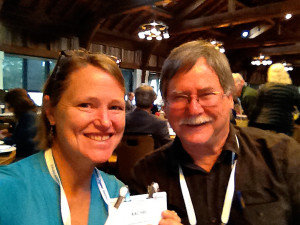
Vote for the guy on the right: Eric Michielssen for SLO County’s Board of Supervisors, District 5
We were pleased to see Eric Michielssen attending the full EcoFarm conference in the midst of his campaign for a position on the San Luis Obispo County Board of Supervisors to represent District 5 from Santa Margarita to Happy Town. He’s running to replace a politician who ascribes to the Tea Party wing of people who hate government doing an exceptionally poor job governing. To our friends in District 5, especially all the eligible voters who attend and live on Cal Poly’s campus: when you’re trying to decide who to vote for or why it’s important to get out and exercise the franchise, we recommend opting for the pro-farmer, pro-environment person who attended EcoFarm in order to get informed about water-soils-food-justice issues, not the person who passed on getting government involved in serious local water issues because she doesn’t believe in government. Good luck Eric: we hope you win!
Learn more about Pozo farmer Eric Michielssen and vote in June!
Are you registered? Vote for the environment and for all of us, on June 7!
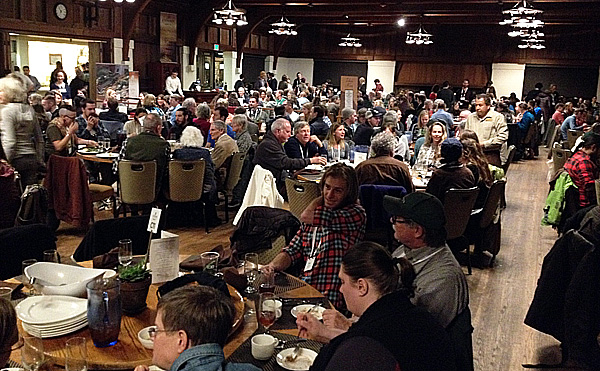
This room teems with ecological farming mycorrhiza who are networking, learning, and preparing to bring information and hope back to their own farming communities

